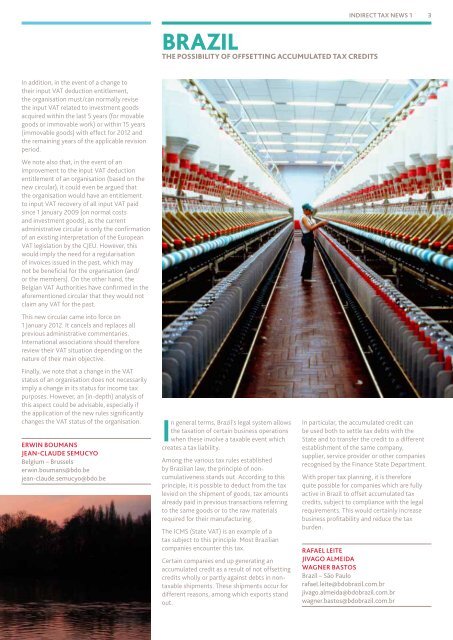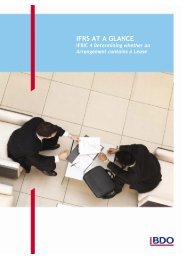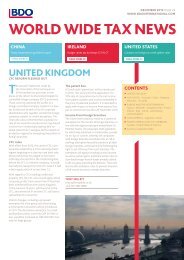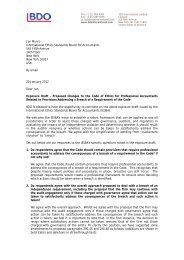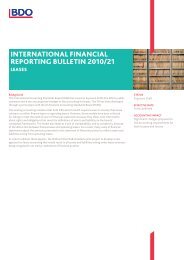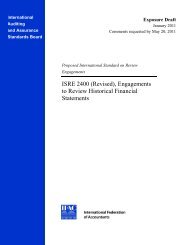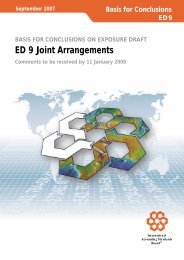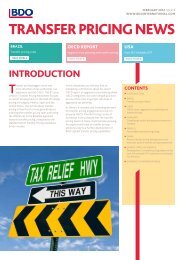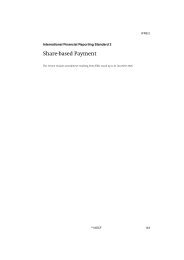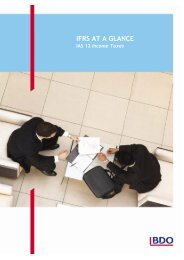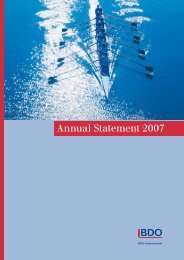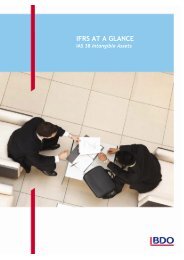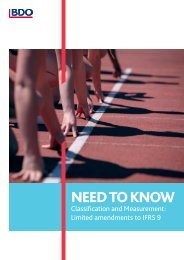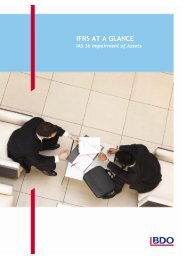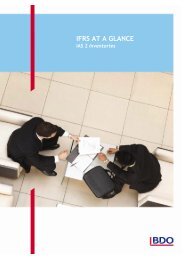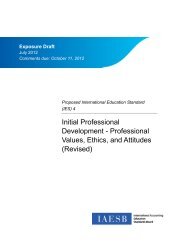Indirect Tax News 1 - March 2012 - BDO International
Indirect Tax News 1 - March 2012 - BDO International
Indirect Tax News 1 - March 2012 - BDO International
You also want an ePaper? Increase the reach of your titles
YUMPU automatically turns print PDFs into web optimized ePapers that Google loves.
INDIRECT TAX NEWS 1<br />
BRAZIL<br />
THE POSSIBILITY OF OFFSETTING ACCUMULATED TAX CREDITS<br />
3<br />
In addition, in the event of a change to<br />
their input VAT deduction entitlement,<br />
the organisation must/can normally revise<br />
the input VAT related to investment goods<br />
acquired within the last 5 years (for movable<br />
goods or immovable work) or within 15 years<br />
(immovable goods) with effect for <strong>2012</strong> and<br />
the remaining years of the applicable revision<br />
period.<br />
We note also that, in the event of an<br />
improvement to the input VAT deduction<br />
entitlement of an organisation (based on the<br />
new circular), it could even be argued that<br />
the organisation would have an entitlement<br />
to input VAT recovery of all input VAT paid<br />
since 1 January 2009 (on normal costs<br />
and investment goods), as the current<br />
administrative circular is only the confirmation<br />
of an existing interpretation of the European<br />
VAT legislation by the CJEU. However, this<br />
would imply the need for a regularisation<br />
of invoices issued in the past, which may<br />
not be beneficial for the organisation (and/<br />
or the members). On the other hand, the<br />
Belgian VAT Authorities have confirmed in the<br />
aforementioned circular that they would not<br />
claim any VAT for the past.<br />
This new circular came into force on<br />
1 January <strong>2012</strong>. It cancels and replaces all<br />
previous administrative commentaries.<br />
<strong>International</strong> associations should therefore<br />
review their VAT situation depending on the<br />
nature of their main objective.<br />
Finally, we note that a change in the VAT<br />
status of an organisation does not necessarily<br />
imply a change in its status for income tax<br />
purposes. However, an (in-depth) analysis of<br />
this aspect could be advisable, especially if<br />
the application of the new rules significantly<br />
changes the VAT status of the organisation.<br />
Erwin Boumans<br />
JEAN-CLAUDE SEMUCYO<br />
Belgium – Brussels<br />
erwin.boumans@bdo.be<br />
jean-claude.semucyo@bdo.be<br />
In general terms, Brazil’s legal system allows<br />
the taxation of certain business operations<br />
when these involve a taxable event which<br />
creates a tax liability.<br />
Among the various tax rules established<br />
by Brazilian law, the principle of noncumulativeness<br />
stands out. According to this<br />
principle, it is possible to deduct from the tax<br />
levied on the shipment of goods, tax amounts<br />
already paid in previous transactions referring<br />
to the same goods or to the raw materials<br />
required for their manufacturing.<br />
The ICMS (State VAT) is an example of a<br />
tax subject to this principle. Most Brazilian<br />
companies encounter this tax.<br />
Certain companies end up generating an<br />
accumulated credit as a result of not offsetting<br />
credits wholly or partly against debts in nontaxable<br />
shipments. These shipments occur for<br />
different reasons, among which exports stand<br />
out.<br />
In particular, the accumulated credit can<br />
be used both to settle tax debts with the<br />
State and to transfer the credit to a different<br />
establishment of the same company,<br />
supplier, service provider or other companies<br />
recognised by the Finance State Department.<br />
With proper tax planning, it is therefore<br />
quite possible for companies which are fully<br />
active in Brazil to offset accumulated tax<br />
credits, subject to compliance with the legal<br />
requirements. This would certainly increase<br />
business profitability and reduce the tax<br />
burden.<br />
RAFAEL LEITE<br />
JIVAGO ALMEIDA<br />
WAGNER BASTOS<br />
Brazil – São Paulo<br />
rafael.leite@bdobrazil.com.br<br />
jivago.almeida@bdobrazil.com.br<br />
wagner.bastos@bdobrazil.com.br


